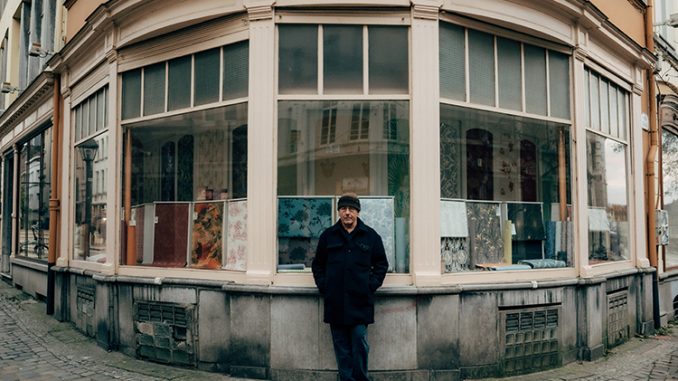
By Brian Wise
Irish folk-singer Luka Bloom is on his 15th Australian tour, a visit that will keep him here until April.
Since his last journey he has released three albums – Live De Roma (2019), Bittersweet Crimson (2020) and Out Of The Blue (an instrumental album recorded during Covid and released in 2021).
This time Bloom arrives on the heels of a triple album set: Wave Up To The Shore, a collection of 50 songs and tunes from across his 50-year career.
“On Friday the 20th November, 1992, I did my first gig in the Southern Hemisphere. It was in the Enmore Theatre in Sydney,” recalls Luka Bloom when I catch up with him by Zoom to have a talk about his current tour and his recent epic release.
“My love for Australia was born, and it has never dimmed, or faded, not in the slightest. Over 14 tours, I have loved every show, every town or city I have played in. It is always fun and always an adventure.”
Bloom has admitted that being close to 70 (he turns 69 on May 23), he is “closer to my final visit to Australia than my first one” and that “every gig counts these days. They always did, but especially now. Every opportunity to sing in Australia is precious to me. I am grateful for the welcome you have given me, and my songs. This tour will be long, with cities I have never before sung in, like Cairns, Townsville; and later Albany in the Southwest.”
This is where our wide-ranging conversation picks up.
Rhythms: Thanks for talking to us. We’re looking forward to seeing you back in Australia. How many tours will this have been?
Believe it or not, it’ll be my 15th tour of Australia and I still remember my first show in Australia. I remember it like yesterday.
What do you remember most about it?
Okay, here’s the deal. I released Riverside in 1990 and it got a huge amount of airplay songs like ‘Delirious’, ‘You Couldn’t Have Come At A Better Time,’ ‘Gone To Pablo’, ‘Rescue Mission’. But I didn’t tour. I just was so crazy going around America and Europe and they said, ‘You’ve got to go to Australia’. I said, ‘No, I’m not going to go to Australia until I’m ready because it’s such a long way away. I want it to be right. I remember arriving when ‘The Acoustic Motorbike’ was released. I arrived in Australia and it’s the only country in the world where there was an audience for my songs before I ever did one gig. It’s the only time it’s ever happened to me in my life.
I just remember a sold out Enmore in Sydney on my first ever gig in the Southern Hemisphere and it was a mind-blowing experience that it stayed with me ever since. I mean, it’s very unusual to fall in love with a country in one day, but that’s kind of what happened to me, and I’ve loved every time I’ve ever visited since. This is tour number 15. I’m nearly 70. Who knows? Maybe this could be the last, this could be the last hurrah. I don’t know, but I’m just so grateful for it that I feel like this is a tour of gratitude coming up here for me.
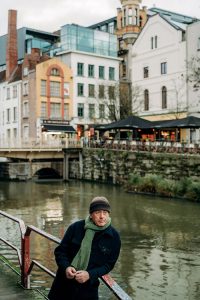 Well, you’re going to be with us for almost six weeks, aren’t you? It’s a fairly long tour.
Well, you’re going to be with us for almost six weeks, aren’t you? It’s a fairly long tour.
It’s a bit nuts at my age to be doing so many shows but I’m up for it and I want to do it. I’ve always said to Adrian [Bohm] who books me that the first couple of tours were quite short, and I’ve just taken in the main cities, and I just said I’d love to go to some other places and we certainly are this time.
There are a few other Irish musicians here around the same time: Lisa O’Neill and David Keenan.
Brilliant.
Irish musicians have obviously been in the headlines, particularly with the recent passing of Shane MacGowan and before that Sinead O’Connor. It’s really brought the music to the fore, hasn’t it?
I guess I see it a bit differently in the sense that I think for us, it’s always been this way. I’m no longer shocked at the stream of talent that comes through in Ireland. Obviously, when you have iconic figures like Sinead and Shane passing away, I suppose in other countries, it does bring Irish music again up into the forefront of people’s minds, but it’s a constant stream here.
I don’t know if you saw this young Irish woman who was on the Jools Holland show two weeks ago. She’s 16-year-old blues singer and musician from county Donegal and she just blew it out of the water. It was like the New Year’s Eve Jools Holland show and it featured this 16-year-old girl that people in Ireland didn’t even know, and she’s going to be a star. She will come to Australia and she will do Byron Bay and people will be blown away by her, and she’s only 16. So, there’s a constant stream of music and writing and songwriting, and I’m delighted. I’m always happy when I hear of people like that arriving in Australia and getting the experience of performing in Australia.
Funny you should mention that 16-year-old Muireann Bradley, who I spoke to before Christmas.
You’re kidding me. Yeah?
Like everybody else, I was blown away by the album when I first heard it. I couldn’t believe it. I have to say she has got one of the biggest responses I’ve ever had when I played it on the radio show and people just couldn’t believe that she was so young.
I’ve seen when she did the Jools [Holland] Show. I went into the BBC website and there were all these comments coming. There’s one guy said, ‘I’m 72 years old, I’m playing the blues my whole life, and I’ve just been upstaged by a 16-year-old from dunny gall. It’s so depressing.’
Well, there’s something about the feeling, isn’t it? It’s okay to have technique. You’ve got plenty of guitarists who’ve got good technique but combining that with the voice and the feeling for the songs – and obviously you’d know all about this by now – you have to have that feeling for the songs, don’t you?
There are certain things you can’t learn, they can’t be taught! I come across people all the time with great technique, whether it’s singing technique or guitar technique or stagecraft, and you can sense and feel what’s been learned, and that’s a wonderful thing.
It’s always wonderful to see people that have learned so much and worked so hard and grow so much, but she’s just got it in her blood, she’s got it in her bones.
So, when someone like that comes along, it transcends rehearsal and practice. She was on a show with Rod Stewart. She was on a show with all these amazing artists and she was the last act on, I think, and people were kind of a little bit chatty at the start of her song, but within a minute they were completely and totally taken in by 16-year-old girl. It wasn’t just her chops, it was her complete authenticity.
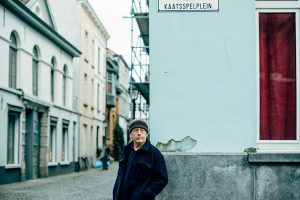 We are looking forward to seeing her out here if she makes it. She’s going to be pretty busy in the next year or so – but we’ve got a brand new triple album release of yours to talk about, Wave Up To The Shore.
We are looking forward to seeing her out here if she makes it. She’s going to be pretty busy in the next year or so – but we’ve got a brand new triple album release of yours to talk about, Wave Up To The Shore.
The song. Interestingly, we’re talking about a 16-year-old girl and the song which gave me the title of this album was a song I wrote when I was 16 in 1973. It’s a song I’ve really come to love. It’s like a song that I wrote and then I forgot about it for decades. I was singing it at home, ‘Wave Up To The Shore’, singing at home here last year. And I suddenly realized, ‘Oh my God, I wrote this song in 1972 when I was 16, 50 years ago’. It’s a sad song. It’s got lonesomeness in it, and it’s even got a bit of death in the last verse. But it was completely real to me because I was a bit of a messed up young fella and writing songs like this was how I explained the world to myself. And here I am 50 years later reproducing that song along with 50 other pieces from across the decades.
Well, your brother [Christy Moore] recorded it. He probably recorded it before you did. Did he?
That song would’ve disappeared were it not for my brother, because I wrote it and then I kind of forgot about it and a couple of years later he recorded it. I wrote it when I was 16 and I recorded it first when I was 61, which is hilarious.
Were you playing music? Were playing professionally when you were 16. What were you doing at that age? You said you were a bit messed up but you must’ve been playing guitar and writing songs.
I mean, it was a rich time for someone who only was able to begin to explain the world to himself and was hiding a lot on his own in his bedroom to keep out of trouble.
The beautiful thing about that was that there were rich pickings. This was the time of Nick Drake, Ralph McTell. It was obviously the time of Neil Young, Joni Mitchell. These people were coming into their prime – Leonard Cohen, Bob Dylan – and so this is the river that I was tapping into at the age of 16. I was playing a guitar when I was nine, but by the age of 12, 13, 14, I realised, ‘Oh my God, you don’t just have to sing the old Irish ballads. You can actually write about your own experiences of the world and accompany them with your guitar like John Martyn.’ Look at the people I had to inspire me. There was even one of them in my own house for God’s sake!
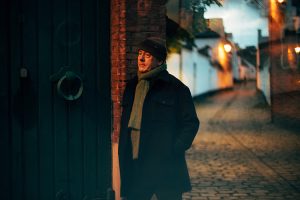 So, when did you start your professional career in terms of performing?
So, when did you start your professional career in terms of performing?
My first paid gig? I was the opening act for Planxty in 1972 and then for the next years, next decade and a half, I suppose, I was really, really struggling to get tiny little gigs and folk clubs. I wasn’t in great shape, and so things alluded me and ran away from me and the odd little opportunity, I succeeded to blow them.
But my life changed somewhat in the mid-eighties and eventually I went to America in 1987, 88, and things kind of took off in 1990, and it was a bit of a miracle to be honest with you, but I’m eternally grateful for it.
So, was it the anniversary of your first song or recording of it that prompted you to undertake this latest project which contains some 50 tracks from across your past?
Yeah, it was that song. It was the realisation that not only had I written this song 50 years previously but all I’d done was write songs, perform and record them ever since. It’s all I’ve ever done.
I’ve never had a job, I’ve never done anything else. I’ve no degrees. This is the only thing I know how to do. I just thought, I’m constantly moving forward as you want to. I’m not really that into nostalgia, but I think it’s okay maybe once in your life to just pause for a moment.
There was the long pause of Covid wasn’t there? So, it was just during the latter stages of that pause that I thought, ‘Well, maybe it’s okay to just look back for a moment and let’s just look at these few of these songs and do raw versions, just raw solo acoustic versions of them recorded in my house with nice equipment and send it out to people. I’ve actually been really pleased with the response to it. It’s been a lovely thing to do.
So, they’re all new versions, yours of your older songs. I think there’s a new instrumental on it too as well, isn’t there?
Yeah, which is an interesting thing. Before I released that album, I did something during the Great Pause. I did something I never imagined I’d do. The Solitude of Covid inspired me to go back to the time when I had no gigs and there was no touring and there was no record deal. And all I was doing was sitting at home in my bedroom playing my guitar, and I went right back to that.
This is before this triple album now, and I did something I never imagined I’d do, which is make an entirely instrumental album. And that was a complete shock to me. The response to it was a quick complete shock as well. It’s called Out of the Blue. The Covid came out of the blue and that album came out of the blue, and that sort of led kind of nicely into this triple CD. So, since the last time I was in Australia, which was five years ago, a couple of things have happened. Obviously Covid happened. I aged five years, haven’t I, and I’ve released four albums since I was last in Australia, which is kind of crazy. But there you go.
The great thing is that all this material is available online at your website, although I notice that the latest project is available as a triple CD and digital download, but it’s not going to be available on vinyl. That might be a bit challenging, I suppose,
50 songs? So, it’d have to be like six pieces of vinyl. I’m sorry. I mean, I get the vinyl renaissance, but I’m actually completely at peace with CD. I’ve always liked CD. I don’t do the streaming thing. I don’t have Spotify, I don’t use it. I still buy CDs myself. I’ve just come back from a couple of months in Holland and Belgium and I bought about 80 CDs, which now you can get on sale in most shops because they’re not really that mainstream anymore. But I’m more interested in the music than the format, to be honest.
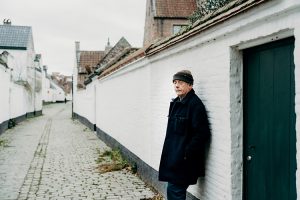 Just thinking about your career and the craft over the years of songwriting, one of my theories about the new digital age is that too many people are recording when they shouldn’t be recording. They should be tucked away developing their songwriting.
Just thinking about your career and the craft over the years of songwriting, one of my theories about the new digital age is that too many people are recording when they shouldn’t be recording. They should be tucked away developing their songwriting.
I completely agree with you. I mean, the great news about this age is that anyone can make a record, and the bad news about this age is that anyone can make a record. I completely agree with you, and I think that a lot of people are being deprived of the pain, of struggling to get to the point where you can make a record.
Like Muireann Bradley is a freak in the sense of it’s so unbelievably rare for someone to blow everyone away the first time out. That’s rarely happening now because so many people are just sending too much stuff out there.
It’s almost impossible now to connect with an artist because they’re on Spotify, and if you hear something in a cafe, you go, oh, what’s that song? They say, ‘Oh, it’s just something from a playlist. I’ve no idea what it is.’ So, a really beautiful song or singer can pass you by and you might never get a chance to hear them again. There’s just so much stuff out there. I completely agree with you.
I still believe in this thing called the album, the record, that whatever it is that shows a period of work, a body of work, a period of time where you’re locked away with your struggles or your imagination, and it’s like the way you want to see art in a gallery. You want to see your summer, you want to see a collection of work that represents a body of time that a person has spent, and you want to feel the evolution of that person. So, if I fall in love with an artist, a singer, or whatever it is, I want to connect with the body of work they’ve done. I’m not interested in having one song in my phone.
Tell us about that instrumental album that must’ve been an enjoyable, if not challenging experience for you.
If I’m honest with you, it kind of saved me because when Covid happened, I was about to release the studio album, the most expensive album I’ve made since I became independent. I was about to release it, and we did it in Windmill Lane. I just went nuts with this album called Bittersweet Crimson, and literally the week we’d finished it, everything shut down, and it was really awful.
But I just started sitting at home playing guitar, and I tapped into some old Irish harp tunes that were recorded by a friend of mine, Steve Cooney, who’s an Australian of origin, but long-term Irish resident, amazing musician. He released an album of old Irish Harp Tunes and I dived into that, and that got me started.
Then I just spent the whole of the first year of Covid reacting to, I found I was so upset with what was happening in the Covid time that I couldn’t find words, I couldn’t write songs, and all I could do was just play the guitar alone at home in the house.
I began to really enjoy it and I leaned into it and just fell in love with it again. It was like renewing the vows with the guitar. I ended up making this record I never, ever imagined I would do, because I wouldn’t have had the patience to sit still for long enough to do an instrumental album. But I really love it. It’s one of the few albums I’ve ever made that I can even listen to myself.
So, are they all new original compositions?
No, most of them are, but about of the 12 or 13 tracks, four or five of them are very old traditional Irish pieces that I just rearranged for guitar.
Now, what sort of repertoire can we expect from you on the forthcoming tour? I mean, you’ve got a lot of material to choose from by now – and there is that triple CD set. How are you going to hone down the material?
Well, here’s the way I’m approaching this. I’ve actually thought a little bit about what this tour represents for me, and I’m almost 70 and it’s my 15th tour, and I feel something like a deep well of gratitude to Australia, and that’s the spirit I want to come to Australia with.
So, I’ve sort of requested that wherever possible for the first time, I’d like to do my show without opening acts, and I’d like to do my gig without a set list and just walk on stage and sing whatever I feel in that moment.
This is a really important tour for me. I don’t know how many more times I’m going to get to come back to Australia if I ever do, and as a touring singer. I’m also going to places on this tour I’ve never been to before. I mean, this will be the most extensive Australian tour I’ve ever done. So, this is a tour of gratitude for me, and I’m not planning any, I’m not promoting a specific record. I’m not planning anything. I’m just going to walk on stage and sing a song, tell a story, and continue.
Are there any songs that you expect that you have to do every week?
Yeah, there are actually, and I don’t mind saying that. There’s two or three songs I sing every single night and I don’t sing them just because I know there are people who want to hear them. I sing them because they still hold such resonance for me. Since I wrote a song called ‘The City of Chicago’ in 1984, I’ve probably sung it every single time I’ve ever stood on a stage and I always feel it. I always connect with it. It always resonates with me, both emotionally and particularly if I’m singing far away from home because that’s what the song is about. It’s about the people who’ve had to leave Ireland since the 1840s. So, that song resonates a lot with me when I’m in Australia.
I have to sing ‘Diamond Mountain’ every night because that’s very much the Australian experience of the Irish people who left Ireland to go to Australia.
And then there’s a couple of songs like ‘Exploring the Blue’ that I love to play because there’s something about the sound and the texture and the simplicity of that song that moves me everytime I sing it. But outside of three or four or five songs, I think there has to be a little element of the uncertain and the unknown for me. So, I love it when I surprise myself with a song that I maybe haven’t sung for 10 or 15 years and suddenly pull it out in Lizotte’s in Newcastle or God knows where.
Do you do any cover versions?
Oh, loads of them. I even covered, ‘Throw Your Arms Around Me’, the old Hunters and Collectors song! The way people are very – I won’t say precious but – they’re very protective of a song that they love. I remember when I learned that song, I didn’t realise what an iconic song it was in Australia and I think I introduced it very casually: ‘Oh, I decided to learn an Australian song. You might know, or whatever.’ Suddenly, everybody was singing it, and I was like, ‘Oh my God, I just learned this big, huge song!’ I didn’t realise how big it was. I do lots of covers.
Probably my best-known cover was a song by LL Cool J called, ‘I Need Love’ from 1992. But I have a follow up to that from about five years ago, and I’m not going to tell you what it’s, it’s a nice surprise.
I was talking to David Keenan the other week, or last week and I was saying to him how Irish artists have a sort of inbuilt audience wherever they go. They’re guaranteed of an audience, aren’t they?
It’s not necessarily so. There are countries where I didn’t succeed in really generating an audience. Interestingly, our nearest neighbors in the UK haven’t. I’ve done a lot more touring in Australia than I’ve done in the UK. This is a really interesting thing. I know of artists who aren’t doing folk clubs in America but they arrive in Ireland and for some reason their songs resonate in a huge way. Nancy Griffith wasn’t wasn’t quite an enormous star at a certain point in her work in life, but she was huge in Ireland. She was adored in Ireland as well. I think Ireland was the first country to really get on board the David Gray phenomenon. I think it’s an interesting thing that different countries connect with different songs or different singers at different moments, and I find that kind of fascinating. Actually. I can’t get a gig in France. I play in Germany every year for the last 30, 40 years, but I can’t get a gig in France. I can’t get a gig in Spain. I can’t get a gig in Portugal. I get to play in all the cold countries where people speak English as a second language. But it’s lovely. I kind of love that. I love it that different territories have artists that resonate with them that don’t necessarily resonate somewhere else.
Well, as I said, we’re looking forward very much to seeing you out here. Thanks very much for taking the time to talk to me.
It’s been a real treat to chat with you.
LUKA BLOOM RENMAINING TOUR DATES
TICKETS ON SALE NOW – BOOK AT BOHMPRESENTS.COM
EUROA NORTHERN REPUBLIC – TUESDAY 5 MARCH
YACKANDANDAH STAR HOTEL – WEDNESDAY 6 MARCH
CANBERRA THE STREET THEATRE – FRIDAY 8 MARCH
PORT FAIRY FOLK FESTIVAL – 9 & 10 MARCH
QUEENSCLIFF TOWN HALL – MONDAY 11 MARCH
NEWCASTLE LIZOTTE’S – FRIDAY 15 MARCH
KATOOMBA BLUE MOUNTAINS MUSIC FESTIVAL – 16 & 17 MARCH
MOOLOOLABA MOO MUSIC – TUESDAY 19 MARCH
TOWNSVILLE C2 @ TOWNSVILLE CIVIC THEATRE – THURSDAY 21 MARCH
CAIRNS TANKS ARTS CENTRE – FRIDAY 22 MARCH
BRISBANE POWERHOUSE – SUNDAY 24 MARCH
SYDNEY FACTORY THEATRE – WEDNESDAY 27 MARCH
MILTON, MILTON THEATRE – FRIDAY 29 MARCH
ADELAIDE THE GOV – TUESDAY 2 APRIL
PERTH RECHABITE HALL – THURSDAY 4 APRIL
MANDURAH PERFORMING ARTS CENTRE – FRIDAY 5 APRIL
FAIRBRIDGE FAIRBRIDGE FESTIVAL – 6 & 7 APRIL
TICKETS ON SALE NOW – BOOK AT BOHMPRESENTS.COM

